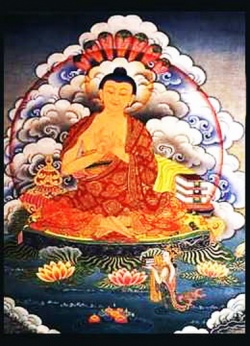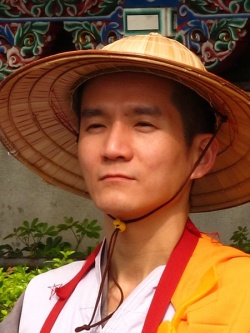Maha-Nidana Sutta
Maha-Nidana Sutta
The Great Causes Discourse (excerpt)
(Delineations of a Self)
"To what extent, Ananda, does one delineate when delineating a self? Either delineating a self possessed of form and finite, one delineates that 'My self is possessed of form and finite.' Or, delineating a self possessed of form and infinite, one delineates that 'My self is possessed of form and infinite.' Or, delineating a self formless and finite, one delineates that 'My self is formless and finite.' Or, delineating a self formless and infinite, one delineates that 'My self is formless and infinite.'
"Now, the one who, when delineating a self, delineates it as possessed of form and finite, either delineates it as possessed of form and finite in the present, or of such a nature that it will [naturally] become possessed of form and finite [in the future/after death), or he believes that 'Although it is not yet that way, I will convert it into being that way.' This being the case, it is proper to say that a fixed view of a self possessed of form and finite lies latent [within that person).
"The one who, when delineating a self, delineates it as possessed of form and infinite, either delineates it as possessed of form and infinite in the present, or of such a nature that it will [naturally] become possessed of form and infinite [in the future/after death), or he believes that 'Although it is not yet that way, I will convert it into being that way.' This being the case, it is proper to say that a fixed view of a self possessed of form and infinite lies latent [within that person).
"The one who, when delineating a self, delineates it as formless and finite, either delineates it as formless and finite in the present, or of such a nature that it will [naturally] become formless and finite [in the future/after death), or he believes that 'Although it is not yet that way, I will convert it into being that way.' This being the case, it is proper to say that a fixed view of a self formless and finite lies latent [within that person).
"The one who, when delineating a self, delineates it as formless and infinite, either delineates it as formless and infinite in the present, or of such a nature that it will [naturally] become formless and infinite [in the future/after death), or he believes that 'Although it is not yet that way, I will convert it into being that way.' This being the case, it is proper to say that a fixed view of a self formless and infinite lies latent [within that person).
(Non-Delineations of a Self)
"To what extent, Ananda, does one not delineate when not delineating a self? Either not delineating a self possessed of form and finite, one does not delineate that 'My self is possessed of form and finite.' Or, not delineating a self possessed of form and infinite, one does not delineate that 'My self is possessed of form and infinite.' Or, not delineating a self formless and finite, one does not delineate that 'My self is formless and finite.' Or, not delineating a self formless and infinite, one does not delineate that 'My self is formless and infinite.'
"Now, the one who, when not delineating a self, does not delineate it as possessed of form and finite, does not delineate it as possessed of form and finite in the present, nor does he delineate it as of such a nature that it will [naturally] become possessed of form and finite [in the future/after death), nor does he believe that 'Although it is not yet that way, I will convert it into being that way.' This being the case, it is proper to say that a fixed view of a self possessed of form and finite does not lie latent [within that person).
"The one who, when not delineating a self, does not delineate it as possessed of form and infinite, does not delineate it as possessed of form and infinite in the present, nor does he delineate it as of such a nature that it will [naturally] become possessed of form and infinite [in the future/after death), nor does he believe that 'Although it is not yet that way, I will convert it into being that way.' This being the case, it is proper to say that a fixed view of a self possessed of form and infinite does not llies latent [within that person).
"The one who, when delineating a self, delineates it as formless and finite, either delineates it as formless and finite in the present, or of such a nature that it will [naturally] become formless and finite [in the future/after death), or he believes that 'Although it is not yet that way, I will convert it into being that way.' This being the case, it is proper to say that a fixed view of a self formless and finite lies latent [within that person).
"The one who, when delineating a self, delineates it as formless and infinite, either delineates it as formless and infinite in the present, or of such a nature that it will [naturally] become formless and infinite [in the future/after death), or he believes that 'Although it is not yet that way, I will convert it into being that way.' This being the case, it is proper to say that a fixed view of a self formless and infinite lies latent [within that person).
(Assumptions of a Self)
"To what extent, Ananda, does one assume when assuming a self? Assuming feeling to be the self, one assumes that 'Feeling is my self' [or] 'Feeling is not my self: My self is oblivious [to feeling)' [or] 'Neither is feeling my self, nor is my self oblivious to feeling, but rather my self feels, in that my self is subject to feeling.'
"Now, one who says, 'Feeling is my self,' should be addressed as follows: 'There are these three feelings, my friend — feelings of pleasure, feelings of pain, and feelings of neither pleasure nor pain. Which of these three feelings do you assume to be the self?' At a moment when a feeling of pleasure is sensed, no feeling of pain or of neither pleasure nor pain is sensed. Only a feeling of pleasure is sensed at that moment. At a moment when a feeling of pain is sensed, no feeling of pleasure or of neither pleasure nor pain is sensed. Only a feeling of pain is sensed at that moment. At a moment when a feeling of neither pleasure nor pain is sensed, no feeling of pleasure or of pain is sensed. Only a feeling of neither pleasure nor pain is sensed at that moment. "Now, a feeling of pleasure is inconstant, fabricated, dependent on conditions, subject to passing away, dissolution, fading, and cessation. A feeling of pain is inconstant, fabricated, dependent on conditions, subject to passing away, dissolution, fading, and cessation. A feeling of neither pleasure nor pain is inconstant, fabricated, dependent on conditions, subject to passing away, dissolution, fading, and cessation. Having sensed a feeling of pleasure as 'my self,' then with the cessation of one's very own feeling of pleasure, 'my self' has perished. Having sensed a feeling of pain as 'my self,' then with the cessation of one's very own feeling of pain, 'my self' has perished. Having sensed a feeling of neither pleasure nor pain as 'my self,' then with the cessation of one's very own feeling of neither pleasure nor pain, 'my self' has perished.
"Thus he assumes, assuming in the immediate present a self inconstant, entangled in pleasure and pain, subject to arising and passing away, he who says, 'Feeling is my self.' Thus in this manner, Ananda, one does not see fit to assume feeling to be the self.
"As for the person who says, 'Feeling is not the self: My self is oblivious [to feeling),' he should be addressed as follows: 'My friend, where nothing whatsoever is sensed (experienced) at all, would there be the thought, "I am"?'"
"No, lord."
"Thus in this manner, Ananda, one does not see fit to assume that 'Feeling is not my self: My self is oblivious [to feeling).'
"As for the person who says, 'Neither is feeling my self, nor is my self oblivious [to feeling), but rather my self feels, in that my self is subject to feeling,' he should be addressed as follows: 'My friend, should feelings altogether and every way stop without remainder, then with feeling completely not existing, owing to the cessation of feeling, would there be the thought, "I am"?'"
"No, lord."
"Thus in this manner, Ananda, one does not see fit to assume that 'Neither is feeling my self, nor is my self oblivious [to feeling), but rather my self feels, in that my self is subject to feeling.'
"Now, Ananda, in as far as a monk does not assume feeling to be the self, nor the self as oblivious, nor that 'My self feels, in that my self is subject to feeling,' then, not assuming in this way, he is not sustained by anything (does not cling to anything) in the world. Unsustained, he is not agitated. Unagitated, he is totally unbound right within. He discerns that 'Birth is ended, the holy life fulfilled, the task done. There is nothing further for this world.'
"If anyone were to say with regard to a monk whose mind is thus released that 'The Tathagata exists after death,' is his view, that would be mistaken; that 'The Tathagata does not exist after death'...that 'The Tathagata both exists and does not exist after death'...that 'The Tathagata neither exists nor does not exist after death' is his view, that would be mistaken. Why? Having directly known the extent of designation and the extent of the objects of designation, the extent of expression and the extent of the objects of expression, the extent of description and the extent of the objects of description, the extent of discernment and the extent of the objects of discernment, the extent to which the cycle revolves: Having directly known that, the monk is released. [To say that,] 'The monk released, having directly known that, does not see, does not know is his opinion,' that would be mistaken.
(Seven Stations of Consciousness)
"Ananda, there are these seven stations of consciousness and two spheres. Which seven?
"There are beings with diversity of body and diversity of perception, such as human beings, some devas, and some beings in the lower realms. This is the first station of consciousness.
"There are beings with diversity of body and singularity of perception, such as the devas of the Brahma hosts generated by the first (jhana). This is the second station of consciousness.
"There are beings with singularity of body and diversity of perception, such as the Radiant Devas. This is the third station of consciousness.
"There are beings with singularity of body and singularity of perception, such as the Beautifully Lustrous Devas. This is the fourth station of consciousness.
"There are beings who,with the complete transcending of perceptions of (physical) form, with the disappearance of perceptions of resistance, and not heeding perceptions of diversity, thinking, 'Infinite space,' arrive at the sphere of the infinitude of space. This is the fifth station of consciousness.
"There are beings who, with the complete transcending of the sphere of the infinitude of space, thinking, 'Infinite consciousness,' arrive at the sphere of the infinitude of consciousness. This is the sixth station of consciousness.
"There are beings who, with the complete transcending of the sphere of the infinitude of consciousness, thinking, 'There is nothing,' arrive at the sphere of nothingness. This is the seventh station of consciousness.
"The sphere of non-percipient beings and, second, the sphere of neither perception nor non-perception. [These are the two spheres.]
"Now, as for the first station of consciousness — beings with diversity of body and diversity of perception, such as human beings, some devas, and some beings in the lower realms: If one discerns that [station of consciousness), discerns its origination, discerns its passing away, discerns its allure, discerns its drawbacks, discerns the escape from it, would it be proper, by means of that (discernment) to take delight there?"
"No, lord."
(Similarly with each of the remaining stations of consciousness and two spheres.)
"Ananda, when knowing — as they actually are — the origination, passing away, allure, drawbacks of — and escape from — these seven stations of consciousness and two spheres, a monk is release through lack of clinging, he is said to be a monk released through discernment.
(Eight Emancipations)
"Ananda, there are these eight emancipations. Which eight?
"Possessed of form, one sees forms. This is the first emancipation.
"Not percipient of form internally, one sees forms externally. This is the second emancipation.
"One is intent only on the beautiful. This is the third emancipation.
"With the complete transcending of perceptions of (physical) form, with the disappearance of perceptions of resistance, and not heeding perceptions of diversity, thinking, 'Infinite space,' one enters and remains in the sphere of the infinitude of space. This is the fourth emancipation.
"With the complete transcending of the sphere of the infinitude of space, thinking, 'Infinite consciousness,' one enters and remains in the sphere of the infinitude of consciousness. This is the fifth emancipation.
"With the complete transcending of the sphere of the infinitude of consciousness, thinking, 'There is nothing,' one enters and remains in the sphere of nothingness. This is the sixth emancipation.
"With the complete transcending of the sphere of nothingness, one enters and remains in the sphere of neither perception nor non-perception. This is the seventh emancipation.
"With the complete transcending of the sphere of neither perception nor non-perception, one enters and remains in the cessation of perception and feeling. This is the eighth emancipation.
"Now, when a monk attains these eight emancipations in forward order, in reverse order, in forward and reverse order, when he attains them and emerges from them wherever he wants, however he wants, and for as long as he wants, when through the ending of the mental fermentations he enters and remains in the fermentation-free release of awareness and release of discernment, having directly known it and realized it in the here and now, he is said to be a monk released in both ways. And as for another release in both ways, higher or more sublime than this, there is none."
That is what the Blessed One said. Gratified, Ven. Ananda delighted in the Blessed One's words.





